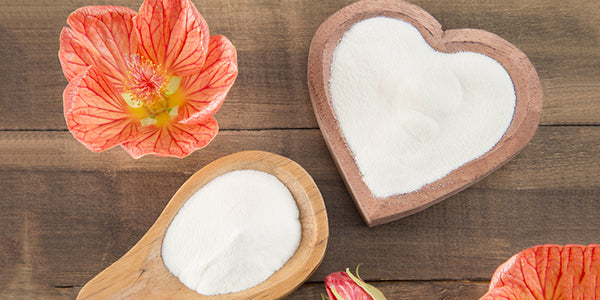
Though most nutritional claims do not often live up to their hype, the science supporting collagen's benefits to the body are promising.
But what exactly is collagen and how can improve your health? Find out here!
What Is Collagen?
Collagen is the primary structural protein in the body and major component of skin, hair, muscles, bones, cartilage, and other connective tissues. The protein essentially acts as glue that provides integrity and organization to its respective constituents.
Collagen is composed of a few amino acids, specifically glycine, proline, and hydroxproline, and comes in various types. Whereas there are at least 16 identified collagen types, Types I, II, and III constitute 80 to 90 percent of all the protein types:
Type I collagen is the most abundant protein type in the body and found in skin, tendons, blood vessels, organs, and bones.
Type II is the main collagen protein found in cartilage, the connective tissue that protects the ends of bones at a joint.
Type III is the second most abundant collagen and found in reticular fibers, a type of connective tissue that supports soft tissues and organs, such as the lungs, liver, and spleen.
Collagen supplements are produced into hydrolyzed collagen from a number of sources, including bovine and marine life. Hydrolyzed collagen are small peptides digested quickly and reach the bloodstream within an hour, where they are transported into the target tissues and start the production of new collagen fibers.
Benefits of Collagen Protein and Peptides
From strengthening hair and nails to improving gut health, collagen offers some unique benefits to the body.
1. Strengthens Skin, Hair, and Nail Health
Collagen is particularly hyped and sought out in hopes to defy the effects aging has on skin such as wrinkles, fine lines, and dryness. And with one of its prominent roles providing elasticity to the skin, collagen's popularized benefit for turning back the hands of time does appear quite linear.
But it is not just an assumption, as the research stacks up! In fact, a study published in Skin Pharmacology and Physiology demonstrated women who took collagen hydrolysate for a mere four weeks had improvements in skin elasticity, moisture, and evaporation. Adding on another compelling element, taking collagen peptides has shown to reduce skin wrinkles.
But it does not stop there… A study published in the Journal of Medicinal Food concluded long-term use of collagen peptides leads to an improvement of cellulite and has a positive impact on skin health.
And when it comes to hair and nail health, there is evidence collagen peptides increased nail growth and improved brittle nails in conjunction with a notable decrease in the frequency of broken nails, along with baring itself as an effective target for hair loss.
2. Improves Digestive Health
With collagen located in the gastrointestinal tract and lining, researchers and health goers have an ongoing interest in its use to improve digestive and gut health.
Though digestive health embodies a broad spectrum of ailments, there is some indication individuals with inflammatory bowel disease have lower levels of collagen, which proposes its administration may be useful for mitigating inflammation and remodeling digestive tissue.
Since supplementing with collagen has shown to strengthen the gut lining and safeguard from inflammation, it may reduce symptoms of leaky gut, Crohn's disease, ulcerative colitis, and other digestive conditions.
3. Improves Joint Pain
The rich amino acids of collagen play an important role in the building of joint cartilage, or the connective tissue that protects the ends of bones at a joint.
There is some evidence that the provision of collagen reduces joint pain in individuals with osteoarthritis, which is the most common form of arthritis and occurs when the protective cartilage on the ends of bones wears down over time.
Beyond those managing arthritis, research shows improvements of joint pain in athletes treated with collagen hydrolysate.
4. Preserves Muscle Mass
Muscle mass is essential for supporting a healthy metabolism, strength, and overall vitality. But like other body organs, muscle mass is habitually lost with advancing age and places a great risk of falls, injuries, and lack of independence.
To complicate the matter, elderly people often have a low intake of dietary protein despite the projected higher needs of protein. Nutrition experts warrant a high-quality protein supplement to protect nitrogen balance, or essentially the difference between nitrogen intake and loss that reflects gain or loss of total body protein.
After comparing two varying protein supplements, along with matching protein quantity, researchers found taking a hydrolyzed collagen protein supplement can maintain nitrogen balance and preserve lean body mass during just 15 days of consumption on a relatively low-protein diet.
Complimentary research published in The British Journal of Nutrition also discovered collagen peptide supplementation in combination with resistance training improved body composition by increasing fat free mass and muscle strength and decreasing fat mass.
5. Boosts Physical Performance
Considering protein is critical for exercise and muscle recovery, it is logical collagen can boost physical performance by preserving muscle mass.
Along with the studies revealing collagen improved muscle strength in combo with resistance training and combatted joint pain in athletes, there is evidence suggesting amino acid supplementation, including proline sourced from collagen, contributes to an improvement in training efficiency in athletes.
6. Mends Sleep Quality
Thanks to its ample glycine content, collagen may have a positive influence on one of America's most common health epidemics: Insomnia.
Glycine has shown to not only mend sleep quality in humans who have difficulty sleeping, but also improve the occasional sleepiness and fatigue induced by sleep restriction.
And as a double bonus, skin may benefit from the extra shuteye, as lack is sleep is hypothesized to impair skin integrity!
Choosing A Collagen Supplement
With such renowned benefit regarding collagen protein and peptides, you might be wondering "What is the best collagen supplement out there?"
Amongst the numerous product lines available, choosing a reputable brand can difficult. Here are a few tips to help you navigate the world of collagen:
• For a higher-quality product, select a collagen supplement produced from organic and sustainable sources, including grassfed beef and wild-caught seafood. Reputable products reveal their collagen sources, including the collagen peptides by Vital Proteins, and details "Our Collagen Peptides are sourced from grass-fed, pasture-raised bovine hides from Brazil. Our Marine Collagen is sourced from wild-caught, non-GMO Red Snapper off the coast of Hawaii."
• Pick a product confirming it supplies hydrolyzed collagen, which is the fast-acting form of collagen peptides. And since hydrolyzed collagen powder easily dissolves in cold water, it is much more desirable and convenient to take.
• In addition to powders, collagen also comes in gummies and capsules. Select a product based on the type of formula more apt to take on a consistent basis.
• Pure collagen should be colorless when mixed and virtually tasteless, unless the blend includes flavors and extracts. So if it bares a yellow or brown color and tastes a bite "off," the quality might be low.
• If you are to go for flavored collagen protein supplements, be cautious of products using artificial sweeteners. Better options include products using a more natural sweetener, including raw honey and Stevia.







